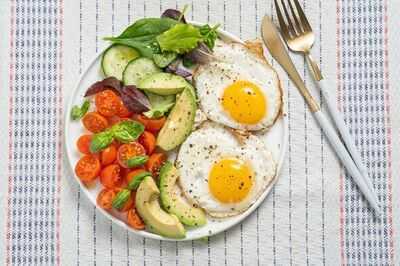
Fried eggs are a quick and delicious meal or snack at any time of day. What's more, they're relatively cheap and surprisingly nutritious, providing protein, fat and important vitamins while being relatively low in calories.
But they can sometimes feel a bit of a chore, especially if they stick to the pan or, in trying to avoid them sticking, you use too much oil or butter. This can lead to the oil or butter splattering and staining your clothes, as well as resulting in a finished fried egg that is too oily or greasy. Many people also destroy their fried egg by trying to flip it over to cook the top.
For some people, frying the egg in water is the answer. Kaitlin, a cook and founder of Modern Vintage Cooking, says she uses a splash of water to fry her eggs, describing it as "kind of a cross between poaching and frying".
Others advocate ditching the frying pan altogether for a 60-second method they say is much simpler. Tom Ferris, egg expert from Roostys, a website for chicken care products, says: "People are always surprised when I tell them you can make a fried-style egg in the microwave."
But there is an even cleverer way to fry your eggs that keeps the frying pan but avoids both the risk of sticking and the need to use oil, butter or water. The answer? Baking paper. It might sound surprising but it's a method that lots of people swear by.
Leah Kate McDonnell, who runs the Leah's Cookbook and Craft Ideas YouTube page, says: "If you don't like cooking your eggs with oil, try some baking paper. This is a great hack. No oil needed and they won't stick."
Some even say this method makes the egg taste better, with the yolk flavour coming through brighter and the white feeling light and clean.
This method really couldn't be simpler.
1. Cut your baking paper to the shape of your frying pan and place it in.
2. Crack your egg on to the paper on a moderate heat, cover with a lid and cook as normal to your liking.
You can still get crispy edges if the pan is well pre-heated and you remove the pan lid for a little while before the end of the cooking process. Though be careful the pan isn't too hot or your paper might burn.
And when you're done with the cooking, you'll have no need to scrub burnt egg from your pan or worry about any oil stains on your clothes!
Although the surface of a frying pan may look smooth, it is actually covered with small cracks and ruts. When you add protein like eggs or meat to a pan, it undergoes a transformation that bonds the food to the metal surface of the pan. It's to prevent this from happening that people add fats like butter or oil to the pan.